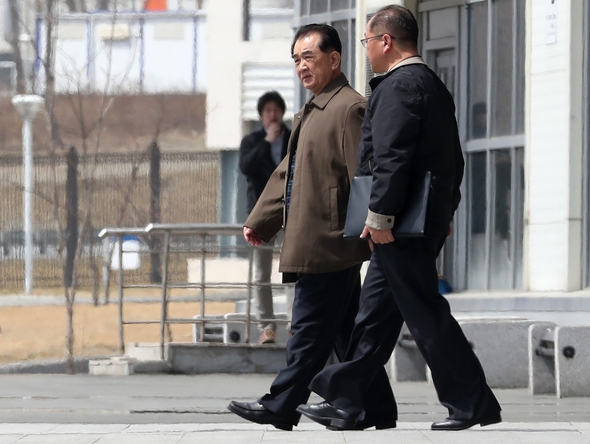Posted on : Apr.22,2019 17:25 KST
Modified on : Apr.22,2019 17:41 KST
 |
|
North Korean State Affairs Commission Chief Secretary Kim Chang-son inspects the facilities at Far Eastern University in Vladivostok on Apr. 21, ahead of the North Korea-Russia summit scheduled for this week. (Yonhap News)
|
The North Korea-Russia summit scheduled for this week is likely to kick off a season of summit diplomacy in Northeast Asia, with a focus on the Korean Peninsula. A Japan-US summit is scheduled for next month, and the possibility has also been raised of Chinese President Xi Jinping visiting North Korea sometime in June. Another possibility is the US holding sequential summits with China and South Korea around the G20 summit, which will take place in Osaka, Japan, near the end of June. There’s also a push to hold an inter-Korean summit. Depending on what response is made to this series of summits, a breakthrough could be reached in the denuclearization talks between North Korea and the US, which are currently in an impasse, or the deadlock could drag on even further. There’s now a greater need than ever for a creative response from the South Korean government.
The primary reason that this week’s North Korea-Russia summit is notable is because Russian President Vladimir Putin was chosen as the first counterpart in summit diplomacy for North Korean leader Kim Jong-un after the North Korea-US summit in Hanoi concluded without an agreement. This summit resulted from the overlapping interests of the two sides: North Korea hopes to secure an ally and increase leverage in its denuclearization talks with the US, in case they become protracted, while Russia wants to exert a greater influence on Korean Peninsula issues. In a personal letter to Xi Jinping prior to the announcement of his summit with Putin, Kim also emphasized the need for advancing their “camaraderie” at a “critical time in Korean Peninsula affairs.”
This reflects Kim’s plan to use the North Korea-Russia summit to prod China while strengthening his negotiating position in relation to the US. The South Korean government needs to exercise its diplomatic capabilities to ensure that North Korea’s cozy ties with China and Russia don’t function as a centrifugal force in the denuclearization talks.
Given these circumstances, it appears as if the war of nerves between North Korea and the US that has continued since the Hanoi summit is being aggravated. The fortunate thing is that the leaders of North Korea and the US have preserved their trusting relationship. But if the impasse drags on too long, even that relationship could be frayed, inevitably making it even harder to find a way out.
Attention should be paid to the Blue House’s confirmation of reports that South Korean President Moon Jae-in has a message to give Kim Jong-un from US President Donald Trump. These reports suggest that this message could be quite significant. It seems possible that North Korea and the US could use this message to open a path for resuming dialogue. But if North Korea-US dialogue is to resume, an inter-Korean summit must first be held to create that opportunity. Various efforts are needed to ensure that the North will make a quick response.
Please direct comments or questions to [english@hani.co.kr]






